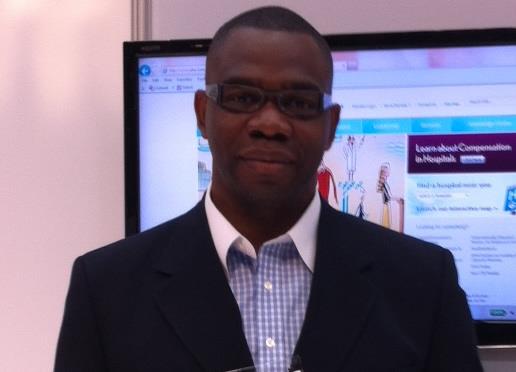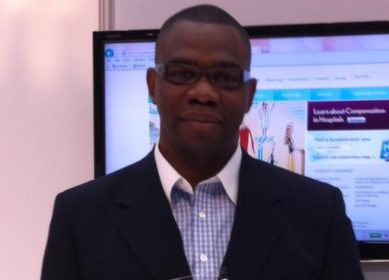National Issues
Post EBOLA – Exploring a National Disease Surveillance System for Nigeria

BACKGROUND:
Every country in the world has a national health system that has been in operation for many years, with the history of health systems in Commonwealth countries stretching back over 150 years, having been implemented in the 1850s under British colonial guidance. All of these health systems were of course manual paper-based systems, which by the early 1970s started to be converted to computerized systems (eHealth) in all of the developed countries (40) for the efficiencies and cost-benefits afforded.
Unfortunately, almost all of the developing countries (151) did not get started in eHealth until the World Health Organization (WHO) created the Health Metrics Network (HMN) in 2005, and emphasized the critical importance of eHealth. Margaret Chan, Director General of the WHO, has many times stated “What gets measured, gets done”. The current Ebola outbreak in West Africa has led to numerous articles in the western press, such as the statement in the New York Times (September 13, 2014) “The outbreaks have outstripped the ability of humanitarian groups and fragile government health systems to treat the sick and slow the spread. “
SURVEILLANCE:
Now, with the emergence of Ebola in several West African countries, the matter of monitoring this emerging potential pandemic is causing all countries to seriously consider how to track the disease, how to treat the patients, and how to control the spread of this very serious disease. An important tool in this track/treat/control process is Disease Surveillance, and preferably eSurveillance.
Almost all countries, including Canada, today have manual paper-based Surveillance* systems (Injury), and only one country in the world has an eSurveillance (Injury) system, namely Jamaica, a developing country. The WHO (PAHO) and the CDC have both done extensive on-site studies of the Heron PAS/eSurveillance System in the hospitals of Jamaica, and according to the CDC “the PAS/Surveillance System could be considered a model for other developing countries”.
DATA CAPTURE at Point-of-Care:
In order to monitor the spread of Ebola in Nigeria it is recommended that the eSurveillance System starts to be implemented in the public hospitals and clinics, and then moved out to all points-of-care over the coming years.
*This is due to the incompatible eHealth systems in the nation’s hospitals since 1972.
The Heron eSurveillance System will capture the following clinical date on presenting patients that is Ebola-specific, namely:
-
Fever (greater than 38.6°C or 101.5°F)
-
Severe headache
-
Muscle pain
-
Diarrhea
-
Vomiting
-
Abdominal (stomach) pain
The Heron PAS contains numerous patient data elements, and this Ebola-specific data will be retained by patient for each and every encounter. Lacking a national Unique Patient Identifier (UPI), this Ebola data will be transmitted to the MOH central computing facility, in e-format, daily, or more frequently if required, on a de-identified basis for local, regional and national aggregation basis. Many other patient-specific data elements – already in the Central Patient Index (CPI) – can be automatically attached to each Ebola case submission. Such data elements include: hospital code/location; date; time; patient age; sex; gender; weight; height; specific prior encounters; residence code; attending doctor/nurse IDs; duration of hospital stay; etc,
CRITICAL FACTORS:
There are many issues associated with the implementation of eHealth, which includes Surveillance – a module within the Heron Patient Administration System (PAS) – in a developing country, and the key ones are:
-
National GDP, and GDP per capita of the country
-
Percentage of GDP allocated to public health
-
The developed countries all allocate a much higher percentage of their GDP (around 8% on average) to health care when compared to the developing countries (around 3% on average). Nigeria allocates 1.9% of its annual GDP to public health.
-
-
National or State control over eHealth decisions (in Canada it is Provincial).
-
In order to have compatibility, and hence data interoperability, a central government directive to standardize is essential. This also affects very seriously the overall eHealth costs, and sustainability.
-
-
-
National public health budget
-
Affordability.
-
The amount spent on eHealth each year – starting with the Heron PAS/eSurveillance System – must be in the range of 1.5% of the annual health budget in order to be affordable. Any grants and other one-time benefits/costs must be taken into account in the annual health budget.
-
-
Sustainability.
-
In order to be sustainability for the long term additional eHealth systems must be amortized over about 10 years, and taken into account within the annual health budget. This is one of the greatest reasons why eHealth systems fail – they are all too often not sustainable.
-
-
-
Infrastructure:
-
This issue must be looked at closely for electrical power, communications networks and Internet availability are important system components. Many of the developing countries have severe problems in this area.
-
-
National standardized PAS implementation:
-
In order to achieve Ebola Surveillance – over the whole country – all hospital systems must be exactly the same (identical), and remain the same indefinitely.
-
-
Where to start in eHealth:
-
Getting STARTED is a most important matter, and must be addressed now.
-
This starting point is clear, and it is with the Heron PAS, which includes Disease Surveillance. No other vendor offers an integrated PAS/eSurveillance approach, and equally important is the fact that Heron’s PAS was developed in Canada to Commonwealth standards, unlike USA systems which are very different, and vastly more expensive to acquire and support.
-
-
Beyond hospitals:
-
It is clear that there are many other points-of-care where Ebola must also be tracked, including doctors’ offices, clinics, homecare visits, entry points into the country, etc., and in due course they must all be addressed.
-
-
Timelines:
-
The first step is to implement the PAS/eSurveillance System in a few ‘pilot site’ hospitals. The implementation of PAS/eSurveillance in ten hospitals would require about 12-18 months after contract signing, with operator training requiring the most time.
-
The roll-out to a state/province of 10 million population could possibly be done in a further 3-5 years. The overall country PAS/eSurveillance implementation could possibly be achieved within 10 years, with all costs aligned to all budgets.
-
-
Integration:
-
What health systems are currently in place that are worth retaining? An example would be the District Health Information System (DHIS), in use in many African countries. The Heron PAS functions at the point-of-care – not only centrally.
-
DALYs – Disability-Adjusted Life Years:
-
Definition: DALYs: Increased economic advantage to the country through an increase in DALYs (Disability-Adjusted Life Years), a concept that is fundamental to the landmark UN WHO 2001 Report ‘Macroeconomics and Health: Investing in Health for Economic Development’, led by Dr. Jeffrey Sachs, the world’s pre-eminent health economist.
The Report presents empirical evidence that longer healthy lives in a country is the driver behind massive economic benefits calculated on the basis of each DALY – being valued at ‘one year of per capita income x the population x the number of life years increased’.
In the case of Nigeria – with an average f/m life expectancy of 53.5 years – when this figure is raised to say 54.0 years – the DALYs economic benefit to Nigeria would be about US$192 billion. This equates to about US$3.6 billion annually over 54 years.
This very important subject will be reviewed in the next Speaking IT Nigeria Limited eHealth article for Nigeria, as this subject provides the country with the greatest economic benefits.
About Author:
Kenneth Nwosu is an eHealth Professional based in Toronto ON Canada. He is a technology and business visionary with proven ability to bring the benefits of IT to solve everyday issues. He has a Bachelor of Electrical/Electronic Engineering, a Post-Graduate Diploma in Applied IT and an MBA with focus on Information Systems.
Mr. Nwosu recently completed graduate studies in eHealth at McMaster University Hamilton Canada, which led to the development of a solution for healthcare delivery in remote areas with low bandwidth internet connection. Ken can be reached at nwosukc@mcmaster.ca




















David Rathgeber
October 1, 2014 at 10:25 pm
We are retired and travelling occasionally.
IN THE FUTURE WE WILL NOT TRAVEL TO ANY COUNTRY WHICH DOES NOT HAVE A FULLY OPERATIONAL DISEASE SURVEILLANCE SYSTEM, AND ANYONE WHO DOES IS TAKING A SIGNIFICANT RISK!
We will limit our travelling to developed countries and countries like Jamaica which have forward thinking medical policies.
It is unfortunate that many countries are putting off installing modern medical facilities when funds are available from several sources which allow this to be done without any cost to the countries economy.
Kelsey Newman
October 2, 2014 at 3:04 pm
@David
You are so right about! The fact that Jamaica has a working system is proof that Nigeria and the other countries in West Africa can afford it.
If Nigeria invested just the money they spend on medical check-ups in India alone, they will have this tested and working system in place. It surprises me that with all the intellectuals in that country, they fail to make the connection between a working health information system and improvement in life expectancy! Prof. Onyebuchi Chukwu, Nigeria’s Minister of Health should be all over this!
As shown by the author, Nigeria is losing more than $2.6 BILLION annually as a result! I am sure the system proposed by the author will not cost that much and even if it does, it is still for the benefit of Nigeria.
Imagine the jobs this system will create for the people of Nigeria too!
John Mensah
October 3, 2014 at 1:23 pm
I found another article written on the author. He sounds like he knows what he is talking about.
http://www.degroote.mcmaster.ca/articles/degroote-graduate-realizes-new-vision-health-care-system/
Ibrahim musa
October 6, 2014 at 6:24 am
THE NIGERIA CUSTOM
AUCTION VEHICLE!!! We sell all kinds of
tokunbo vehicles at a cheaper rate e.g Toyota Camry
Pencil Light 2.2=#450,000, Toyota Sienna=#680,000
,Nissan Murano=#800,000, Nissan Pathfinder=#750
,000, Toyota Highlander=#750,000, Toyota
Prado=#950,000,Toyota Rav4=#650,000, Camry
2007=#750,000,Toyota Yaris=#600,000,Toyota
Matrix=#500,000, Range Rover=#1.5m, Golf
4=#350,000, Toyota Avalon=#750,000, Toyota Hiace
Hummer Bus=#700,000, Toyota Corolla=#600,00
0,toyota venza=# 800,000,Fomatic =#650,000,
Conpresor=#700,000,Golf4=# 350,000,
Golf3=#300,000,Golf2 =#250,000,Honda baby
boy=#450,000. Bmw=#480,000,audiA6=#450,000,i
nfinity=#600,000,infinity jeep =#750,000,
Eod=#750,000.
Call the CUSTOM MARKETING MANAGER
ON +2347065391674 FOR
MORE INFORMATION. SINGED NCS.